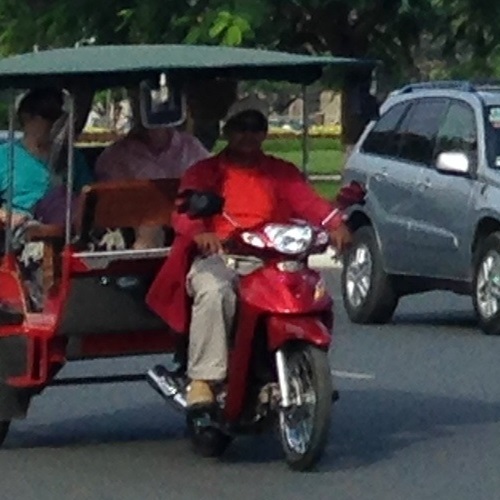Before visiting Phnom Penh, we had done some research on what to expect. Articles and blogs said that one of the primary things to get used to was the constant hassle and demands: ‘Take my tuk tuk!’ ‘Give me money!’ ‘Buy my product!’ I was somewhat concerned, because I hate that kind of pestering.  When that lady in front of the Florence Duomo refused to accept that I already had a scarf, I was ready to scream by her third salvo. Given that persistence is one of the only means to get anything and that I routinely borderline-stalk people as part of my job, I’m not sure why I get so angry about it. But I do, so this was a concern.
When that lady in front of the Florence Duomo refused to accept that I already had a scarf, I was ready to scream by her third salvo. Given that persistence is one of the only means to get anything and that I routinely borderline-stalk people as part of my job, I’m not sure why I get so angry about it. But I do, so this was a concern.
It turns out that this is a myth! Sure: drivers will ask if you want a ‘Tuk tuk?’ and sometimes even slow down beside you while they ask. However, once you say, ‘No, thank you,’ they leave quite politely, sometimes even saying, ‘Thank you’ as they drive off! That is the opposite of hassle. (Now, I’ve noticed that drivers are less likely to take my ‘no’ seriously than they are to take B’s. However, it could be because I tend to shake my head no rather than saying it – though it could also be that they take women to be more fickle and/or persuadable.) And the same goes for those selling goods. Certainly, they would like you to buy their products, but most don’t want your money for nothing: pride is not just the purview of the wealthy.
Now, I am a hard-hearted woman. I don’t ever give money to beggars or buskers. I know that many of these people need that money: they may have illnesses or other circumstances preventing them from using the public assistance system, or they may be waiting for paperwork to go through, or any number of very legitimate reasons. And I know that my donations to organizations like Modest Needs are not much different from giving on the street. All the same, I just don’t give money in this way. My reaction is no different around the world. However, in addition to these folks, many cities also have people selling goods on the streets, like the aforementioned Cambodians. They are not seeking handouts: they have secured what they could – food, crafts, etc. – and they are sitting or standing for hours, selling these wares. This happens in the US as well, with everything from fake designer hand bags to DVDs. However, in my experience, these sellers tend to be young men – and the goods tend to be things not produced by these sellers. It turns out that this I can stand, but old women sellers with goods that could have been made by them are my kryptonite.
There was a sixty-something woman like this in Budapest, in the Fisherman’s Bastion tourist area. She was selling crocheted table cloths that resembled giant doilies. I have absolutely no need for such a thing. Moreover, I didn’t have room for it in my bag, and I couldn’t think of anyone to whom to gift it. All the same, I looked at this older woman, standing for hours in the hope of selling one of these cloths, and I couldn’t walk by, because she looked exactly like my grandmother did a decade or two ago. Both her actual countenance and the look on her face were exactly those of my grandma: the grandma who had helped raise me, whom I call at least once a week and visit at least once a year, and who doesn’t have to stand anywhere selling anything partially because of luck. I couldn’t walk past this woman with the familiar face and the familiar look of resignation. So, I admired her cloth, and I bought it, without negotiations. You could see the care she put into it: she carefully pulled out a plastic bag in which to carry my prize and tied the top with the kind of attention paid by people who value each thing they have, because they don’t have many of them. And as I walked away, I tried not to cry. (In a fun twist, I gave the cloth to my grandmother as a gift.)
There was another woman like this in the Seoul underground, selling something that looked like bean sprouts. No one seemed to want to buy them, and yet she was sitting and waiting. She looked to be sixty or seventy years old, and she was bundled up in layers because the temperature was around 17 degrees Fahrenheit! If I had spent one more minute there, I would have bought all of her sprouts.
Here in Cambodia, many people invoke this same feeling in me. They are working hard and being persistent and taking care with each item they sell – and there is no shortage of older women among them. And each time, to some extent, I see my grandmother when I look at them. So, if border control would like to know why my bag contains kilos of bean sprouts, doilies, and every other such thing, I guess I’ll just have to tell them about my grandmother.


